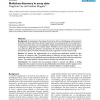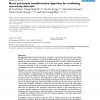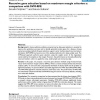78 search results - page 13 / 16 » Identifying Gene Signatures from Cancer Progression Data Usi... |
108
click to vote
BMCBI
2006
14 years 11 months ago
2006
Background: Non-negative matrix factorisation (NMF), a machine learning algorithm, has been applied to the analysis of microarray data. A key feature of NMF is the ability to iden...
125
click to vote
BMCBI
2004
14 years 11 months ago
2004
Background: A routine goal in the analysis of microarray data is to identify genes with expression levels that correlate with known classes of experiments. In a growing number of ...
BMCBI
2007
14 years 11 months ago
2007
Background: With microarray technology, variability in experimental environments such as RNA sources, microarray production, or the use of different platforms, can cause bias. Suc...
111
click to vote
BMCBI
2006
14 years 11 months ago
2006
Background: In class prediction problems using microarray data, gene selection is essential to improve the prediction accuracy and to identify potential marker genes for a disease...
BMCBI
2007
14 years 11 months ago
2007
Background: The p53 gene family consists of the three genes p53, p63 and p73, which have polyhedral non-overlapping functions in pivotal cellular processes such as DNA synthesis a...



